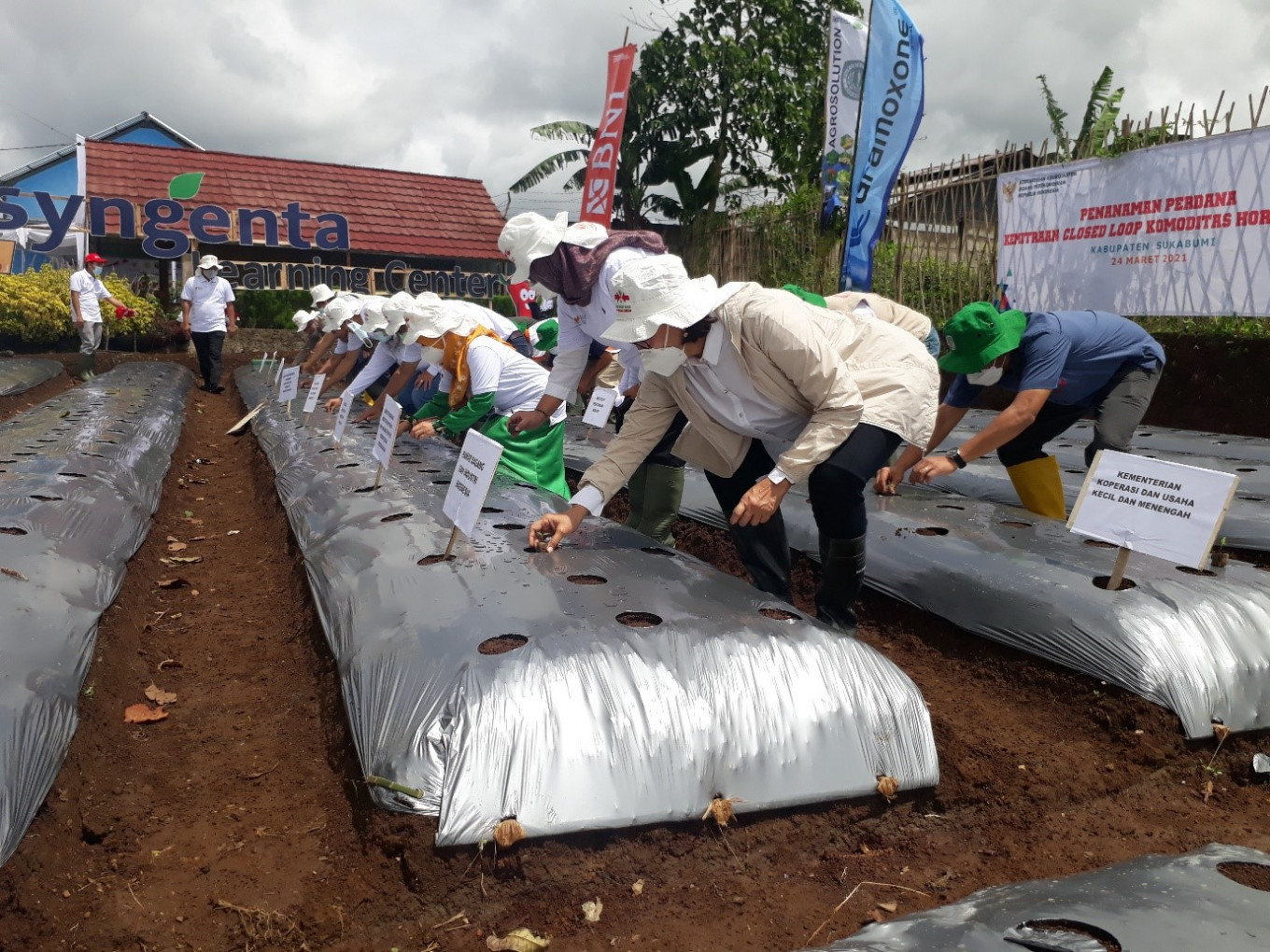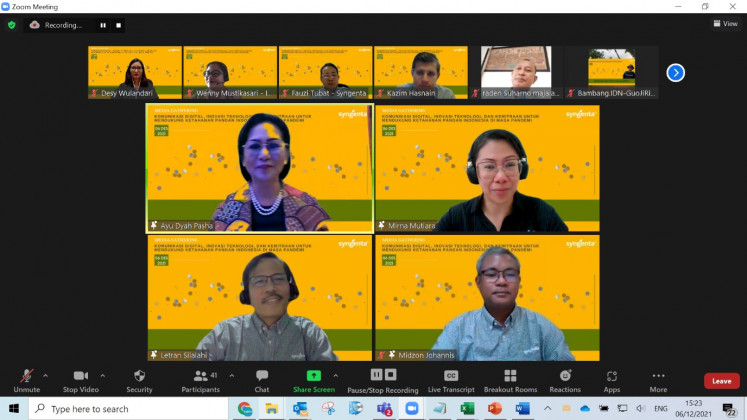Popular Reads
Top Results
Can't find what you're looking for?
View all search resultsPopular Reads
Top Results
Can't find what you're looking for?
View all search resultsSyngenta changes the agricultural landscape of Indonesia
The problems that was brought on by the pandemic was plenty, and Syngenta is ready to offer a solution to at least one; food security.
Change text size
Gift Premium Articles
to Anyone
T
he problems that was brought on by the pandemic was plenty, and Syngenta is ready to offer a solution to at least one; food security. Syngenta Indonesia has held 6,900 virtual events since March 2020, including webinars conducted by the field agronomist team with the farming community, field reviews, and the launch of new agricultural technologies that help farmers increase their agricultural productivity. More than 153,000 farmers have engaged in these virtual activities during the pandemic to learn about good agricultural practices and maintain productivity, and to share knowledge of new food strategies.
Syngenta Indonesia continues to innovate to maximize the role of digital communication technology to reach and provide mentoring education to farmers, since digitalization has been a lifeline for most sectors with the restrictions put in place in accordance with health protocols. This change in the agricultural industry is the focus of Syngenta's attention to continue to maintain its contribution to assisting farming communities in Indonesia.
In addition to mentoring programs through webinars, the company uses social media to make sure the line of communication to farmers will always remain open. Through Facebook, Instagram, YouTube, and Twitter, the company provides various information related to good agricultural practices, increasing farmer productivity, the latest agricultural technology and also the use of appropriate crop protection products so that farmers' health is maintained.
“With digital communication, it is now easier for farmers to gain new knowledge and market their products. We are happy to be able to help facilitate this new development for farmers," said Kazim Hasnain, General Manager of Syngenta Indonesia, at their 2021 media gathering event in Jakarta (6/12/2021).
. (Courtesy of Syngenta/.)Syngenta also initiated partnerships with various parties who have a vision and mission to advance Indonesian agriculture, both with privately-owned companies and with the government. One of these partnerships include their initiative in collaboration with Sayurbox and Tani Foundation, which are part of TaniHub.
Through the Closed Loop Horticulture program under the auspices of the Coordinating Ministry for Economic Affairs of the Republic of Indonesia, they launched a program that aims to build supply chain ecosystems and value chains that are integrated and end-to-end models, where farmers receive cultivation knowledge according to good agricultural practices, by paying attention to cropping patterns, harvesting patterns, post-treatment. The program assists farmers through all the stages, from harvesting to marketing, to produce good quality products that meet the market’s needs.
Indonesia is among the countries that produce the greatest number of corns, producing 19.7 million tons in 2020, a huge increase from 9.5 million tons only two decades ago. Most of the producers are small farmers with an average land area of only 0.5 hectares. In East Java, the area with the biggest number of production, corn crops amounted to 10.05 million land, with a productivity of 5.3 million ton per year, followed by Central Java, Lampung, South Sulawesi, North Sumatra, West Nusa Tenggara, and Gorontalo.
To assist small-owned farmers and the government to reach their target for corn production, Syngenta invented superior hybrid corn seeds. Made through extensive research in accordance with farmers' land conditions and the local weather, they are also a solution for certain pests and diseases that attack corn plants, such as rotten trunk and bulai.
“This rapid increase in corn agricultural productivity in Indonesia has made Indonesia now the largest corn exporter in Southeast Asia. Of course, this makes us all proud, and Syngenta is committed to continuing to be part of the national corn growth," said Fauzi Tubat, Head of Seed Business in Syngenta Indonesia.
However, a looming problem that will reduce productivity remains; global warming and the extreme change in climate condition that has the ability to worsen agriculture in the country.
“The challenge of climate change is getting real. We at Syngenta handle it based on the Good Growth Plan which is expected to have a global impact," said Midzon Johannis, Syngenta Indonesia’s Head of Business.
The Good Growth Plan (GGP) was created to combat this issue. It is a framework for sustainable agriculture program which was first launched in 2013 in the form of 6 commitments to be integrated gradually. By 2020, 14 million hectares of agricultural land have been saved from degradation, and study finds an increase in biodiversity in more than 8 million hectares of agricultural land.
The GGP has now been recognized as the most comprehensive sustainability program focusing on farmers and agricultural land. The company recently added four more commitments, as targets for 2025; to accelerate innovation for farmers and nature, to promote carbon-neutral agriculture, to help farm workers stay healthy and safe, and to foster partnership to create impact.
Moreover, the company also pays close attention to the mental health of its employees across all stages of production, to ensure that Syngenta can keep helping farmers in need.
“We implemented health protocols for all levels of production, launched the EAP (Employee Assistance Program) program to help staff and employees deal with the emotional impact of the pandemic, and implemented Office Based on Hybrid. Productivity continues to run at 100 percent, although some have to work from home (WFH)," said Letran Silalahi, Head of Human Resources.
Syngenta’s has had a presence in Indonesia since the 1960s, from Java and Bali, to Sumatra and Eastern Indonesia. Headquartered in Jakarta, the company has four industrial facilities, namely, a plant protection research and development center, a plant protection product factory, a seed development site, and a seed processing factory.











